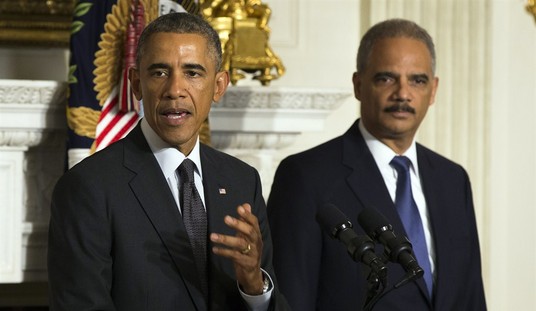Now, cards on the table, we know there are certain websites—who shall go unnamed—who put up headlines like ‘Democrats Shaking at this Legal Development’ But if you click on the link, you discover it was just someone filing a reply brief or something like that, which really wasn’t that big a deal in a case.
We try to be better than that. If we promise a significant legal development in the headline, then we genuinely believe it is a big deal and, in this case, it really is. Elon Musk and TSMSFKA Twitter (The Social Media Site Formerly Known As Twitter) has beaten a motion to dismiss filed by Media Mutters Matters. As you might recall, X corp. sued Media Matters for more or less business defamation related to Media Matters’ reporting that supposedly various company's ads would appear next to ugly content—so called ‘hate speech.’ According to Musk and TSMSFKA Twitter’s allegations, Media Matters only produced those results by massive manipulation of algorithms that they didn’t disclose to the readers. This in turn caused them to lose business, allegedly, and therefore they are suing Media Matters for money damages.
You can read the order and opinion here:
FYI, if you’re curious about the @elonmusk and Twitter/@X victory over @mmfa, this is the order https://t.co/a3XFfgxb2b
— (((Aaron Walker))) (@AaronWorthing) August 31, 2024
It’s not very long and we’re not going to do a full on legal deep dive on this thing. But we will cover a few issues briefly. A motion to dismiss amounts to a defendant saying that ‘the plaintiff can’t even rightfully file this suit.’ It represents an initial challenge and it is not a ruling on the substantive merits of the complaint. The two most important grounds Media Matters pushed for dismissal are personal jurisdiction—basically the argument that this lawsuit can’t happen here with these parties—and failure to state a claim upon which relief can be granted.
We’ll deal with the second issue first. Basically, that is the argument that ‘even if all the facts you allege are true, you still can’t recover.’ Like imagine if a woman says she was eating a Big Mac at home and a guest demanded that she give it to him. She refused to give him her food, so he punches her. Then she sues McDonald’s. In that case, McDonald’s lawyers would get the case dismissed because even if everything she says is true, McDonald’s isn’t responsible for that violence inspired by jealousy.
Here, the allegations that Musk and TSMSFKA Twitter have made are enough that, if true, means that they have a right to recover money damages. But one important point to make is that the court is not saying Media Matters definitely did these things. The entire premise of a motion to dismiss for failure to state a claim is that the plaintiff didn’t even allege a claim that entitles them to relief, so the court assumes for the sake of argument that everything the plaintiff alleges is true. With very few, narrow exceptions, Media Matters can’t challenge the plaintiff’s version of the facts at this point. So really, on this point, what this says is that if TSMSFKA Twitter can prove everything they say, they win. If they can’t, then they might have problems down the road.
The tougher issue for Musk and TSMSFKA Twitter is what is known as personal jurisdiction. This is a sneakily important issue in the Internet age because it limits where you can be sued. Being sued in a far-off state can greatly increase the costs of defending that suit, and it has nothing to do with the merits. A meritorious suit becomes much more expensive to defend, but it does the same thing to the cost of defending against a frivolous suit. For instance, imagine if you were sued in a state on the opposite end of the country from you. Where would you begin, for instance, to even find a lawyer? How much would you be forced to travel to that far off state to defend yourself? Of course, Media Matters probably has more than enough money to deal with those logistical problems, but the rule that applies to them would apply to every person reading this. So if it was just Media Matters, we would say ‘frak them!’ and laugh at their difficulty, but it really isn’t just them.
What the legal issue with personal jurisdiction is, is whether or not you have had enough contact with the relevant jurisdiction—in this case, Texas—to allow you to be sued there. We are not going to get into all the issues involved in making that determination, but we will simply say we have litigated this issue in the past, and we are of the opinion that you really need more contact with Texas than Media Matters has. So, bluntly, we think this decision is vulnerable to challenge.
But even if Media Matters manages to get an appeals court to look at the issue immediately (they typically wait until the entire case ends), and they successfully get the case dismissed based on jurisdiction, that typically means that X Corp. can sue again, just in whatever jurisdiction that Media Matters calls home. Which would potentially cost even more than just dropping the issue.
In any case, assuming this decision stands, the next part is discovery. That is where it really starts to be a bid deal. In discovery, the courts require each party to give up files related to the case, and to answer questions related to the case. During a media-heavy case like this, both sides also hope to find ‘dirt’ on the other side that might or might not be related to the suit, and may or may not be allowed to publish what they get. This could be bad for both sides, including in the ‘court of public opinion’ but this author’s completely uninformed gut feeling is that Media Matters will come out of it worse.
In any case, on to reactions:
LFG!! https://t.co/FRDdOfvbYn
— Elon Musk (@elonmusk) August 30, 2024
I don’t know what LFG stands for but I’m pleased Justice will be served!! https://t.co/bbYtf1hzjy
— Connie a ChildofGod (@conidave) August 30, 2024
It stands for ‘let’s effing go,’ only typically with a curse word instead of 'effing.'
Media Matters is trash!
— Gunther Eagleman™ (@GuntherEagleman) August 30, 2024
Great news!
— Kari Lake (@KariLake) August 30, 2024
Thank you, Elon!
Discovery should be fun
— Being Libertarian (@beinlibertarian) August 30, 2024
Media Matters was so kind to dedicate a whole page on their website to us. Big fans. Please send them our regards when you see them in court.👋
— Project Veritas (@Project_Veritas) August 30, 2024
Media Matters gets the L of the Month award. pic.twitter.com/0ZMyHFpWyY
— Collin Rugg (@CollinRugg) August 30, 2024
Hopefully these folks will be held accountable for their blatant lies. Hard to be optimistic, but I hope it happens.
— Jeff Charles, Doni's St. Bernard🏴 (@jeffcharlesjr) August 30, 2024
Leave no Marxist behind. 😂😂😂 pic.twitter.com/yJXZKPj2UK
— 🇺🇸 UltraMAGA Hillbilly 🇺🇸 (@TruthingtonPost) August 30, 2024
Protect free speech at all costs. pic.twitter.com/z2kyrJWnv7
— Crazy Moments (@Crazymoments01) August 30, 2024
That is referring to the craziness happening right now in Brazil, which we will talk about later.
I drive a Ford a truck so don’t know much about the space age electric cars, but sure glad @elonmusk took over Twitter to allow free speech on this platform. https://t.co/p2Sbc1gjVS
— Brett Favre (@BrettFavre) August 30, 2024
https://t.co/HAmaA4EziB pic.twitter.com/kiFbGP8TzJ
— Madseason (@nickaic) August 30, 2024
This is huge, and I’m not sure everyone really understands what could come for this!
— Jeremiahbullfrog (@Jeremibullfrog2) August 30, 2024
Who funds Media Matters?
What happens during discovery in a lawsuit?
What could be exposed here?
Food for thought 🫡🙏❤️🇺🇸🇺🇸🇺🇸 https://t.co/uTkRPYKYeX
...As the public abandons mainstream media for alternative news sources, news organizations are now facing the added costs of bias in the form of defamation and disparagement lawsuits. Media lawyers are citing protections secured by the “old media” while their clients are…
— Jonathan Turley (@JonathanTurley) August 31, 2024
The cut off text reads:
Media lawyers are citing protections secured by the ‘old media’ while their clients are publicly espousing their intention to frame the news to advance political and social agendas.
We respectfully disagree. First off, when exactly was this magical time when the mainstream media wasn’t biased? It certainly wasn’t when FDR was running for office and the media refused to cover that he was profoundly physically disabled. We will grant that in the 20th century the idea of unbiased media took hold, but we’re not sure it ever had very much reality.
We think the truth is that the mainstream media was always garbage, and we only think it is worse now, because it is easier for ordinary people to point that out. For instance, we recall the media claiming in the 1992 campaign that President George H. W. Bush was amazed at how a supermarket worked. What didn’t get reported at the time was the Bush was at a special store that had unusually advanced technology that would have blown anyone’s minds at that point in time. But instead, it was used to argue that Bush was so out of touch he didn’t know how an ‘ordinary’ supermarket worked. But most Americans never heard the truth behind this smear until well after the election.
Fast forward to his son’s administration and Dan Rather tried to push documents that showed that the second President Bush had gotten special treatment in the national guard, which was allegedly George W. Bush’s method of avoiding the draft. Only it turned out that the documents were fakes, and not even very good fakes. But it wasn’t the mainstream media that brought it to anyone’s attention. Instead, it started with a random commenter going by ‘Buckhead’ who noticed that the documents just didn’t look anything like documents typed on a typewriter. This author, who has a disability that makes it so he has to use keyboards all the time admits he actually said ‘duh’ when he read Buckhead’s comment reproduced on the blog Powerline—we’re embarrassed we didn’t notice as fast as Buckhead, because we had used many typewriters and computers in our lives. Later, Little Green Footballs’ Charles Johnson (who was sane at the time) produced a famous .gif image that showed that the documents supposedly written decades earlier looked almost exactly like a document written in Microsoft Word on default settings. Clearly whoever forged these documents just typed them out in Word and then ran it through a copier a bunch of times to make it look ‘old.’ That in turn led to bloggers going into excruciating detail about fonts and the like and eventually some in the mainstream media started to see there was a serious issue, here. That in turn led to Rather’s downfall. But the important point is that the mainstream media didn’t figure out the documents were fake. It took regular people to point out the problems with them. And since then, it has become even easier for regular people to spot mainstream media falsehoods.
Furthermore, back when the First Amendment was ratified, there was no pretense of impartiality in the news. Newspapers often declared party affiliation in their names and, even when they didn’t, their biases were well understood. Indeed, many people used newspapers as an important function in building their political parties. A party might start to try to get a foothold in a particular town by first opening up a newspaper to promote their view of the world. The First Amendment was always understood to protect biased journalism just like unbiased journalism—even if we suspect truly unbiased journalism is a rarity.
Activist journalism hides behind "freedom of the press" to do their terrible deeds. They then tell you they have immunity if you challenge them.
— Kurt Nimphius' Hair (@Hcp1Hcp) August 31, 2024
The discovery process at CNN revealed some awful garbage behind the scenes.
Time Magazine did a piece on Brock when Trump was running, and I knew after reading it that he was a political low life that would stop at nothing to destroy someone. Although he is no longer with Media Matters, those that remain appear to be cut from the same mould. I wish…
— Kathy Cauthen (@kathy_cauthen) August 31, 2024
The cut off text reads: ‘I wish Elon much success with his suit.’
If Musk and his team are telling accurate in their allegations, this author has the same wish.

























Join the conversation as a VIP Member